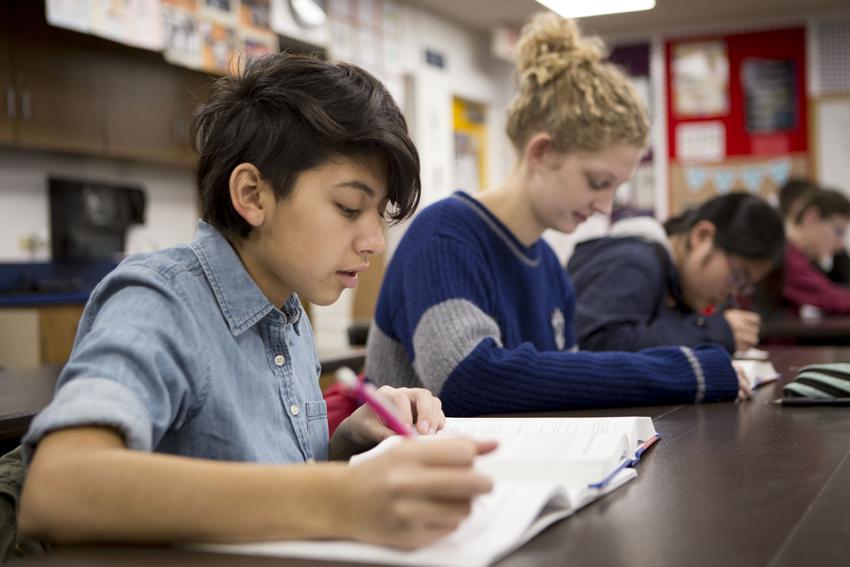English benefits students in future situations
In the coming weeks, John Monke will be writing a mini-series on why students take subject classes and how they can apply it to real life. This week’s article will focus on English and Language Arts and how different grammar and mechanics will help you after college.

English is one of the important subjects in school since it is the language most Americans speak. Writing and speaking are two key part of English; two skills students will use for the rest of their life.
In the article “Why is English Class Important” written by Darla Himeles, she discusses why English is relevant. Himeles is a free-lance writer, editor, and poet who frequently writes about education. In the article, she lists different ways why to take English classes and how it will help students in a future profession.
“Most people learn to write well in English class,” Himeles said. “Learning to express yourself concisely, accurately and convincingly is not simply a box to check on an assessment test or a grading rubric; if you hope to write emails that earn respect, to enter any career in which communication is essential or simply to speak with authority, learning to write well is important.”
According to Himeles, one of the key parts of English is grammar and vocabulary. The more vocabulary a student can learn the easier it is to communicate with others.
“Because English emphasizes reading and writing, your vocabulary and grasp of English grammar will improve if you take English class seriously,” Himeles continued. “The more words you have at your fingertips, and the more comfortable you are using them accurately in sentences, the easier it will be for you to communicate with others. If you speak or hope to speak other languages, studying English vocabulary and grammar will often make learning other languages easier.”
AP student Cathryn Vander Kooi, ’18, has taken both AP English and AP Literature. Both classes have taught Vander Kooi the benefits of taking an advanced placement class.
“AP Literature is such a unique class, I really love learning about the different types of literature throughout history,” Vander Kooi said. “We analyze so many different passages from various time periods that it becomes habit to notice certain patterns. In literature we focus more on specific books, and its fun to dive in and pick apart what the author wanted to convey. Seeing the differences between the different pieces of literature is really fascinating, and makes English all the more fun to learn.”
English classes in high school will not only help with college, but it will also get students on the right track after college. English teacher Andrea Donaghe believes English will be used beyond everyday school.
“I think it is really important to be able to read literature pieces,” Donaghe said. “For me as an English teacher, I think it’s important to see the diversity in things like articles and things media want us to believe or think at their point of view. English is beyond just reading novels I think it’s important as an English teacher to diversify and show kids how English is applied in every day of our lives and we might not even know it. Writing to me is definitely the most important part of English. You will always have to write in life.”
Connor Jens, ’19, has learned new ways to analyze literature in English this year. Jeans believe English will help him prepare for life after school.
“This year in AP Literature with Mrs. Donaghe I’ve learned a lot about analyzing pieces of literary work,” Jens said. “Whether it’s plays, novels, songs, or poetry I’ve learned how to find the deeper meaning and symbolism behind the littlest of things. English to me is important because it’s a way to express our feelings, to say so much with so little essentially. It is a class that most students would agree actually prepared us for the real world.”

Outside of the classroom, English can help students expand their learning abilities. In the article “Why is English Language Arts So Important” by Schoolyard they talked about how English is crucial beyond school.
“Once the transition from learning to read to reading to learn has been made, a student has reached the place in which learning can expand exponentially,” the article said. “English Language Arts enables a student to think more critically and even abstractly about the information there are receiving. That type of critical thinking, coupled with communication during class discussion or in an essay, teaches valuable life skill your students will carry with them after graduation.”
After taking English classes in college, students can finally put all of their learnings into real life. They will have a much better chance of getting a good job than those who did not take English seriously in school.
For more articles, read Senior transfer Alyssa Melillo begins business aspirations with Chameleon Grips and Hyatt and Pouliot bring new skill to track team, hope to break records.




